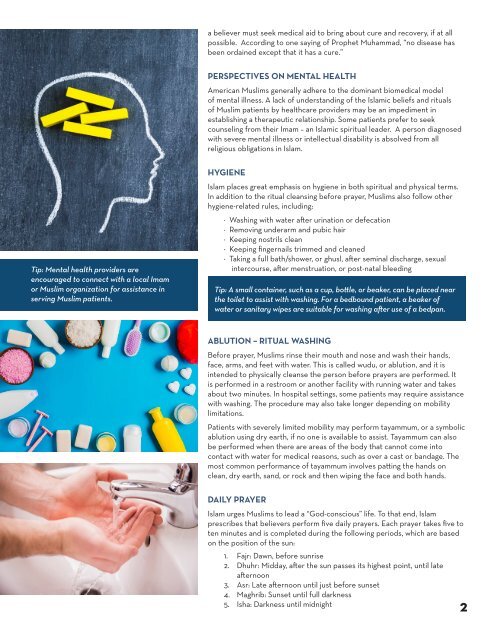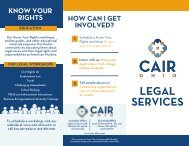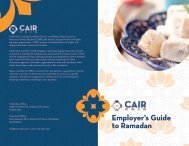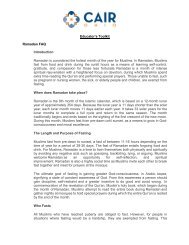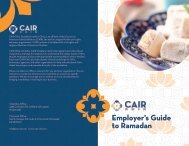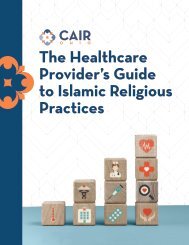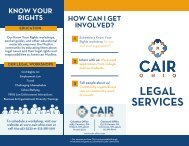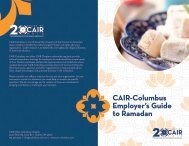CAIR-Ohio-Healthcare-Providers-Guide (2022)
You also want an ePaper? Increase the reach of your titles
YUMPU automatically turns print PDFs into web optimized ePapers that Google loves.
a believer must seek medical aid to bring about cure and recovery, if at all<br />
possible. According to one saying of Prophet Muhammad, “no disease has<br />
been ordained except that it has a cure.”<br />
PERSPECTIVES ON MENTAL HEALTH<br />
American Muslims generally adhere to the dominant biomedical model<br />
of mental illness. A lack of understanding of the Islamic beliefs and rituals<br />
of Muslim patients by healthcare providers may be an impediment in<br />
establishing a therapeutic relationship. Some patients prefer to seek<br />
counseling from their Imam – an Islamic spiritual leader. A person diagnosed<br />
with severe mental illness or intellectual disability is absolved from all<br />
religious obligations in Islam.<br />
Tip: Mental health providers are<br />
encouraged to connect with a local Imam<br />
or Muslim organization for assistance in<br />
serving Muslim patients.<br />
HYGIENE<br />
Islam places great emphasis on hygiene in both spiritual and physical terms.<br />
In addition to the ritual cleansing before prayer, Muslims also follow other<br />
hygiene-related rules, including:<br />
− Washing with water after urination or defecation<br />
− Removing underarm and pubic hair<br />
− Keeping nostrils clean<br />
− Keeping fingernails trimmed and cleaned<br />
− Taking a full bath/shower, or ghusl, after seminal discharge, sexual<br />
intercourse, after menstruation, or post-natal bleeding<br />
Tip: A small container, such as a cup, bottle, or beaker, can be placed near<br />
the toilet to assist with washing. For a bedbound patient, a beaker of<br />
water or sanitary wipes are suitable for washing after use of a bedpan.<br />
ABLUTION – RITUAL WASHING<br />
Before prayer, Muslims rinse their mouth and nose and wash their hands,<br />
face, arms, and feet with water. This is called wudu, or ablution, and it is<br />
intended to physically cleanse the person before prayers are performed. It<br />
is performed in a restroom or another facility with running water and takes<br />
about two minutes. In hospital settings, some patients may require assistance<br />
with washing. The procedure may also take longer depending on mobility<br />
limitations.<br />
Patients with severely limited mobility may perform tayammum, or a symbolic<br />
ablution using dry earth, if no one is available to assist. Tayammum can also<br />
be performed when there are areas of the body that cannot come into<br />
contact with water for medical reasons, such as over a cast or bandage. The<br />
most common performance of tayammum involves patting the hands on<br />
clean, dry earth, sand, or rock and then wiping the face and both hands.<br />
DAILY PRAYER<br />
Islam urges Muslims to lead a “God-conscious” life. To that end, Islam<br />
prescribes that believers perform five daily prayers. Each prayer takes five to<br />
ten minutes and is completed during the following periods, which are based<br />
on the position of the sun:<br />
1. Fajr: Dawn, before sunrise<br />
2. Dhuhr: Midday, after the sun passes its highest point, until late<br />
afternoon<br />
3. Asr: Late afternoon until just before sunset<br />
4. Maghrib: Sunset until full darkness<br />
5. Isha: Darkness until midnight<br />
2


